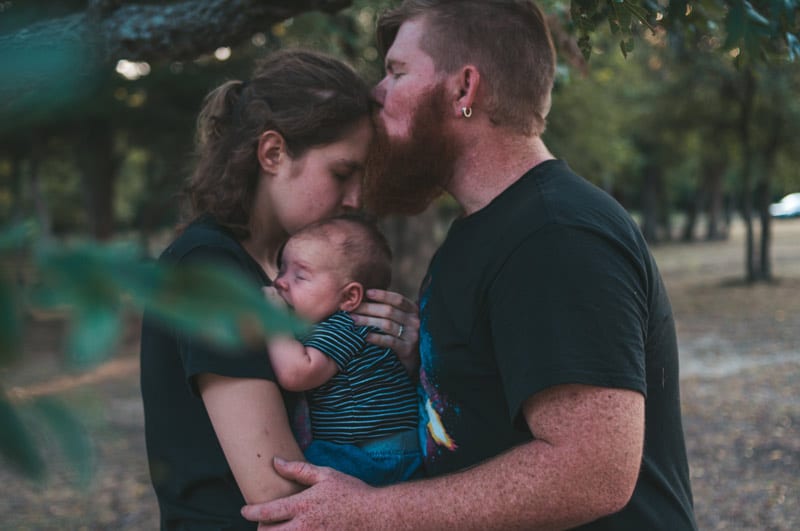Here are three things I know for sure:
- Dealing with Postpartum Depression (PPD) is hard.
- Watching your partner struggle with clinical depression is hard.
- Doing both at the same time feels unbearable.
Dealing with PPD is Hard
I gave birth to my first child on January 16th, 2020. I’m not quite sure I can accurately describe the joy I felt as my son was laid on my chest for the first time—a perfectly healthy baby boy.
Conceptually, I understood that PPD was a risk, but I didn’t feel like it was a serious risk, at least to me. I had a healthy pregnancy, a healthy birth, and a support system, including my parents and several close friends. I felt that these worked to shield me from PPD.
But I learned quickly that PPD doesn’t care. It didn’t care that I had a support network. It didn’t care that our world was very shortly going to be locked down due to a global pandemic. It didn’t care that I overcame depression years before. It just didn’t care.
Those first weeks and months were some of the loneliest of my life, and I was surrounded by loving people. My parents, mother-in-law, and friends were over all the time and always checking in with me via text. We had meals delivered for the first few weeks, and people who offered to do our grocery shopping. I didn’t have to go back to work for 12 weeks. Breastfeeding went relatively smoothly. All these positives, and I still felt gray. It was strange because the love for my son was an intense and colorful feeling, but it was constantly battling with this bleakness that I couldn’t shake.
Prior to giving birth, I felt almost overly confident in my mothering capabilities, but self-doubt started to plague me from the beginning. Icky, intrusive thoughts flooded my brain: Do I know what I’m doing? If I was a better mother, I would know what he wanted. Maybe I made a mistake, yes, this was a mistake.
My energy was spent between keeping this tiny human alive and putting on a face for the world. At the end of the day, I was depleted and wanted to sleep for the next week. There were days I wanted to just curl up in bed. There were nights when I didn’t think I could get up to nurse. There were moments, many moments actually when all I could do was cry alongside my son.
Motherhood, I am learning, is filled with conflicting emotions. For example, I couldn’t imagine life without my son, but I also felt myself grieving the loss of the life I had before, the life I’d never have again. I felt guilty for “letting” that grief tangle with my love. That grief drove in more intrusive thoughts, more bleakness. The cycle continued.
I remember when depression plagued my life in my early 20s. I battled back with medication, therapy, lifestyle changes. All these things seemed to be so far out of reach. Not only was I now trying to pull myself out—I was carrying a little baby with me.
Watching Your Partner Struggle with Depression is Hard
My husband’s story is not mine to tell. The details of his struggles are not mine to share. But just as my PPD affected him and our son, his battle with clinical depression affected me.
I truly believe watching someone you love struggle with mental illness of any kind is one of the hardest things. My only experience is watching someone, living with someone, battling depression, and it is one of the most helpless feelings I’ve ever experienced.
As the partner of a person with depression, I felt as if I was walking a line between supportive and over-stepping. I never knew the right thing to say. I wanted to continue to live my life, but I did not want to leave him behind.
The invisibility of mental illness and the negative stigma associated with it made me feel as if I had to constantly lie, make-up excuses as to why we wouldn’t attend an event, or why my husband wasn’t joining. Even before I took to bed, the lying or lying by omission was exhausting.
It’s painful to know someone you love is in pain. It’s frustrating when the symptoms aren’t exactly visible. It’s a bitter pill to swallow when you realize your marriage (and your baby) isn’t enough of a cure.
Doing Both at the Same Time Feels Unbearable
I understand the debilitating nature of clinical depression. According to the World Health Organization, it is one of the leading causes of disability worldwide. It is real and prevalent in our society. I understand it is a disease, and I respect that it is a serious, sometimes fatal, one. This knowledge allowed me to treat my husband and his illness with patience and understanding.
But then we had a baby. Then, I began to experience PPD.
All the patience and grace I tried to practice went out the window and was replaced with resentment and anger. For the first time, I was angry at his depression.
Nothing out there prepared me to battle PPD, and it certainly didn’t prepare me to battle it without the 100% support of a partner. Even if I could form the words to ask for help, he did not always have the capability to provide it. I was resentful about that.
To be clear—my husband was not completely absent during my struggles. He showed up the best he could. He went to work and provided for our family. He texted me constantly when I was home alone during quarantine. He tried to help when I asked for it.
He tried, and I tried. Sometimes it was enough, and other times it wasn’t.
Surviving the Battle
Here’s one last thing I know: it is possible to survive.
There are no easy answers when it comes to PPD and depression. There are certainly no easy answers when both exist in the same house at the same time (during a global pandemic!). We both came to realize that we were never going to be there for each other until we were there for ourselves. Unless I focused on my own mental health and wellness, I never stood a chance of being a supportive partner for my husband’s battle. And vice versa.
Taking care of mental health looks different for everyone, but If there is a “perfect” way to address it, it is to seek professional help and support. That is something my husband and I have both done. This means therapy, sometimes medication, and taking suggestions. It means putting on our own oxygen masks before helping each other.
Today, I can’t say the battle is completely over, but I can confidently say that it isn’t constant. Most days, we are both able to enjoy our lives, our son, and each other.
If you or someone you know experiences mental health issues, it is important to seek help from a qualified professional. Our Resource Specialist can help you find expert mental health resources to recover in your community. Contact us now for more information on this free service to our users.
About the Author: Stephanie Nagl is a Kansas City-based freelance writer and teacher. You can follow her adventures with mental health, motherhood, and marriage on her blog: stephstumbles.wordpress.com
Photo by Dennis Acevedo on Unsplash
The opinions and views expressed in any guest blog post do not necessarily reflect those of www.rtor.org or its sponsor, Laurel House, Inc. The author and www.rtor.org have no affiliations with any products or services mentioned in the article or linked to therein. Guest Authors may have affiliations to products mentioned or linked to in their author bios only.





